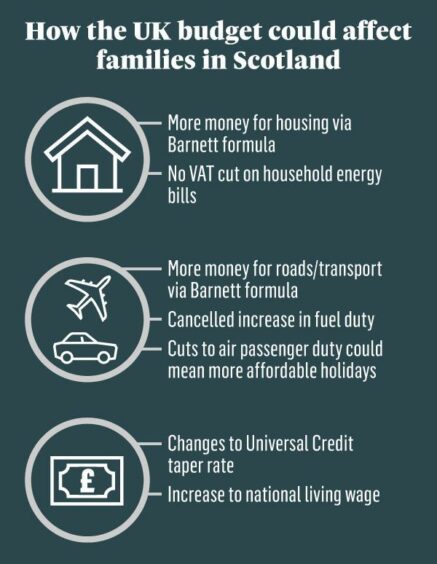Your cash, your home and your travel plans – we unpack how the UK budget could affect your family this year.
The good news is that the UK economy appears to be in better shape than expected. The Office for Budget Responsibility (OBR) now predicts that the economy will return to pre-pandemic levels by the end of the year.
This has allowed Chancellor Rishi Sunak to loosen the purse strings a bit. The investment will benefit Scotland too, through the Barnett Formula.
Politicians and economists will argue over the detail. However it’s safe to say that Covid hit families hard, and many are struggling.
Here are the main impacts for families in Scotland.
Your cash
National Insurance rates will go up…
In September, Boris Johnson said National Insurance Contributions would be increased to help fund the NHS and social care. The lower earnings limit will increase, so you won’t pay NICs until you’ve earned £9,880. However, the vast majority of workers will pay an extra 1.25% per year. Which has a handy NIC calculator.
…but so will minimum wage
People aged over 23 will earn £9.50 per hour from 1 April 2022. This is an increase to the previous National Living Wage, which was £8.91 per hour. Young people aged 21-22 will receive £9.18 an hour, and apprentices £4.81 per hour. There were no changes for other age groups – under 18s are currently paid £4.62 an hour minimum and 18-20 year olds get £6.56 per hour.
People on benefits can keep more of their earnings
Changes to the Universal Credit ‘taper’ rate will allow people who work to keep more of their earnings. Nearly six million people in the UK claim Universal Credit, 40% of them in work. The ‘taper rate’ is the amount of benefit people lose when they start working.
The previous taper rate was 63%, so for every £1 people earn through work, they’d lose 63p in benefits. This has now been reduced to 55%, meaning people can keep more of their earnings.
However, critics point out that the loss of the extra £20 per week paid to Universal Credit claimants in the pandemic has a far bigger negative impact than these measures.
Your home
More affordable housing looks likely
Mr Sunak is putting £24bn into housing. Because of the Barnett Formula, this increased investment will be delivered to Holyrood too. It will allow Finance Secretary Kate Forbes more wriggle room when she sets the Scottish budget next month.
But energy bills remain steep
The new, higher energy price cap kicked in on 1 October. This affects more than 15 million households in England, Scotland and Wales. People on standard tariffs will pay an average of £139 more over the course of a year. The price hike is even steeper for those on prepayment meters.
In response, the Government was under pressure to cut the VAT on household energy bills. Mr Sunak has opted not to do so, saying that people in fuel poverty can be better helped through other measures.
If you’re struggling with fuel bills, Home Energy Scotland offers free, impartial advice.
Getting around
Big investment in roads
As with housing, the Scottish Government will receive a share of the £21 billion going into roads and transport.
No increase in fuel duty
The Government has abandoned plans to increase fuel duty. It follows the RAC stating that petrol prices in the UK have hit a record high. For the 12th year in a row, fuel duty will be frozen at 57.95p per litre. The RAC says that if the hike had gone ahead, a litre of petrol could have cost 147p and diesel 150p.
Cheaper flights
Air passenger duty has been slashed on domestic flights, bringing down the cost of air travel. This move has prompted criticism from environmental groups as Scotland hosts COP26 this weekend. Mr Sunak says he wants to “bring people together across the UK”.
What do families say?
Home-Start Aberdeen works with vulnerable families every day. Manager Eleanor McEwan says the budget is a mixed bag.
“Since the start of the pandemic we have seen increasing numbers of families in financial difficulty, struggling to pay basic costs like food, rent and energy bills,” says Ms McEwan.
“The increase in the minimum and living wages, and the reduction in the Universal Credit taper rate is good news for working families. But for families on benefits, the temporary £20 weekly increase in Universal Credit was a lifeline and it’s disappointing that this hasn’t been reinstated.”
More from the Schools and Family team
First Class: The new P1 intake across the north and northeast
Project Paws: Meet the school therapy dog raising smiles at Alness Academy
Squid Game: Four other playground crazes that caused problems for schools



